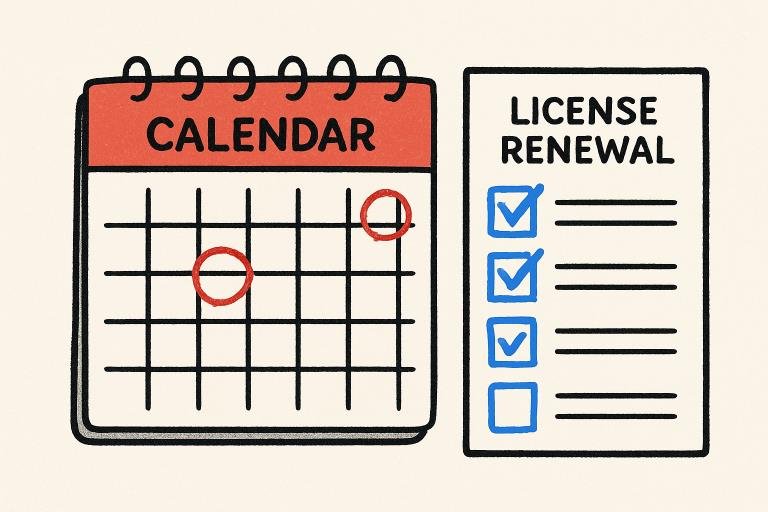Introduction
Renewing your contractor license is crucial for staying compliant with state laws and retaining your eligibility to take on new projects. Navigating the process efficiently maintains your legal ability to work and boosts your trustworthiness with clients and partners. Whether you’re a seasoned professional or renewing for the first time, proactive steps can make the process seamless. If you want to keep your renewal stress-free, understanding your state’s specific requirements is the first step. For contractors in Tennessee, you can find dedicated guidance on TN contractor license renewal to help you through each phase.
Staying organized and aware of your renewal obligations helps prevent last-minute scrambles and the risk of suspension. Planning serves your business interests and enhances your reputation for reliability. Keeping up with your education, regulatory updates, and paperwork ensures every renewal is straightforward and complication-free.
Missing important details or trying to cut corners often ends in avoidable delays or costly penalties. Attention to every step in the renewal process is the best way to remain consistently in good standing. By developing a reliable renewal process, you protect your business operations and hard-earned credentials.
If your business operates in Tennessee, you might also benefit from using a reputable contractor license renewal service for Tennessee. Expert help can save significant time and reduce stress, especially for busy contractors managing multiple projects and deadlines.
Understand State-Specific Requirements
Every state sets unique rules for contractor licensing and renewal. Reviewing your state’s regulations keeps your application compliant and reduces the risk of errors or rejections. Some states require different types of continuing education, proof of insurance, or minimum work experience. To avoid surprises, check the official site for your licensing board as early as possible. The National Association of State Contractors Licensing Agencies (NASCLA) is an excellent resource for state-specific licensing information.
Mark Your Calendar for Renewal Deadlines
Renewal deadlines can lead to financial penalties, project interruptions, or license suspension. Many state boards send reminder emails or letters, but it’s best to set reminders simultaneously. Digital calendar alerts, phone reminders, or simple sticky notes can help you start the process early. Give yourself enough buffer time to gather documents or address unexpected issues, particularly if renewal season coincides with your busiest time of year.
Complete Continuing Education Early
Numerous states expect contractors to complete continuing education (CE) hours before submitting renewal applications. Waiting until the last moment causes added stress and could delay or block your renewal. Research approved CE providers, sign up for courses well in advance, and retain your completion certificates. This proactive approach prevents a mad scramble and ensures you meet every requirement. The importance of continuing education in construction has grown, especially with changes in safety regulations and technology updates.
Gather Required Documentation
As you prepare for renewal, check your documentation checklist thoroughly. You may need to submit proof of insurance, surety bonds, previous work experience records, and certificates for CE hours. In some cases, requirements differ based on your specialty or business size. Organize all paperwork into digital folders for easy retrieval and backup copies if anything goes missing. Document readiness prevents renewal application stalls and helps resolve board follow-up requests quickly.
Double-Check Your Application
Errors or omissions on applications are the most common reason for processing delays. Triple-check every field, signature, and attachment before submission. Double-check spelling, license numbers, business addresses, and contact information. Confirm that every upload is readable and correctly labeled if submitting documents online. Careful review on the front end can spare you weeks of wasted time and help you avoid potentially expensive setbacks.
Stay Informed About Regulatory Changes
Licensing requirements may change, sometimes with little warning. Regularly visiting your state licensing board’s website or subscribing to their updates helps you stay ahead of changes that affect your renewal. For example, a state may suddenly require electronic submissions or alter the accepted forms of insurance. Changes can also impact renewal cycles, fees, or CE hour quotas. These developments are critical for full compliance and uninterrupted work status. Government websites such as the USA.gov state business portals are official sources for recent regulatory news.
Consider Professional Assistance
Using a professional licensing service can be invaluable for contractors who are short on time or managing complex portfolios. These experts help you meet requirements, organize documents, and stay ahead of deadlines. Many professionals find the peace of mind and efficiency gained from outsourcing renewals worth the investment, especially during busy project periods.
Maintain Accurate Records
Meticulous recordkeeping protects your business in the event of audits, disputes, or unexpected requests from licensing boards. Store all renewal correspondence, CE certificates, receipts, and related emails in digital and paper formats. A clear record trail can speed up future renewals and is indispensable for demonstrating compliance if questions arise.
These proactive steps will make your contractor license renewal process smoother, faster, and free from unnecessary stress. By developing a system that works for your business, you ensure ongoing compliance and peace of mind—freeing you up to focus on building your reputation and growing your contractor business.



